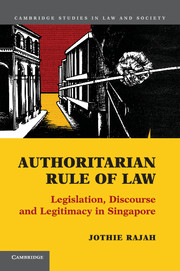Book contents
- Frontmatter
- Contents
- An Insider’s Preface on ‘Rule of Law’ Confusions
- Acknowledgements
- 1 Law, Illiberalism and the Singapore Case
- 2 Law as Discourse
- 3 Punishing Bodies, Securing the Nation
- 4 Policing the Press
- 5 Policing Lawyers, Constraining Citizenship
- 6 Policing Religion
- 7 Entrenching Illiberalism
- 8 Legislation, Illiberalism and Legitimacy
- Bibliography
- Index
- References
1 - Law, Illiberalism and the Singapore Case
Published online by Cambridge University Press: 05 June 2012
- Frontmatter
- Contents
- An Insider’s Preface on ‘Rule of Law’ Confusions
- Acknowledgements
- 1 Law, Illiberalism and the Singapore Case
- 2 Law as Discourse
- 3 Punishing Bodies, Securing the Nation
- 4 Policing the Press
- 5 Policing Lawyers, Constraining Citizenship
- 6 Policing Religion
- 7 Entrenching Illiberalism
- 8 Legislation, Illiberalism and Legitimacy
- Bibliography
- Index
- References
Summary
In October 2007, four thousand lawyers from more than 120 countries converged upon Singapore for the International Bar Association’s (IBA) annual conference. The selection of Singapore as a venue had been controversial, with some members and Singapore dissidents protesting that the IBA was lending legitimacy to a regime that had systematically violated the rule of law. The conference aired these and other issues from the air-conditioned comfort of Singapore’s technologically superior conference facilities.
Singapore’s elder statesman, Lee Kuan Yew, delivered the keynote address at the opening session of the conference. Lee’s address was followed by a question-and-answer session at which Lee was asked to account for Singapore’s problematic standing with regard to the rule of law. Lee’s response to this challenge was to pull out a series of tables citing Singapore’s high rankings in rule of law and governance indicators as proof of the existence of the rule of law in Singapore. According to press reports, the listening IBA members responded by bursting into laughter.
Law, Illiberalism and the Singapore Case
That laughter could mean many things, of course – from admiration for the preparedness of a man who was Prime Minister for thirty-one years, to incredulity at the discursive minimisation of the ‘rule of law’ from a qualitative ideal to schemas that rank and quantify. This laughter, and the range of meanings held within it, point to a Singapore paradox: A regime that has systematically undercut ‘rule of law’ freedoms has managed to be acclaimed as a ‘rule of law’ state.
- Type
- Chapter
- Information
- Authoritarian Rule of LawLegislation, Discourse and Legitimacy in Singapore, pp. 1 - 54Publisher: Cambridge University PressPrint publication year: 2012



